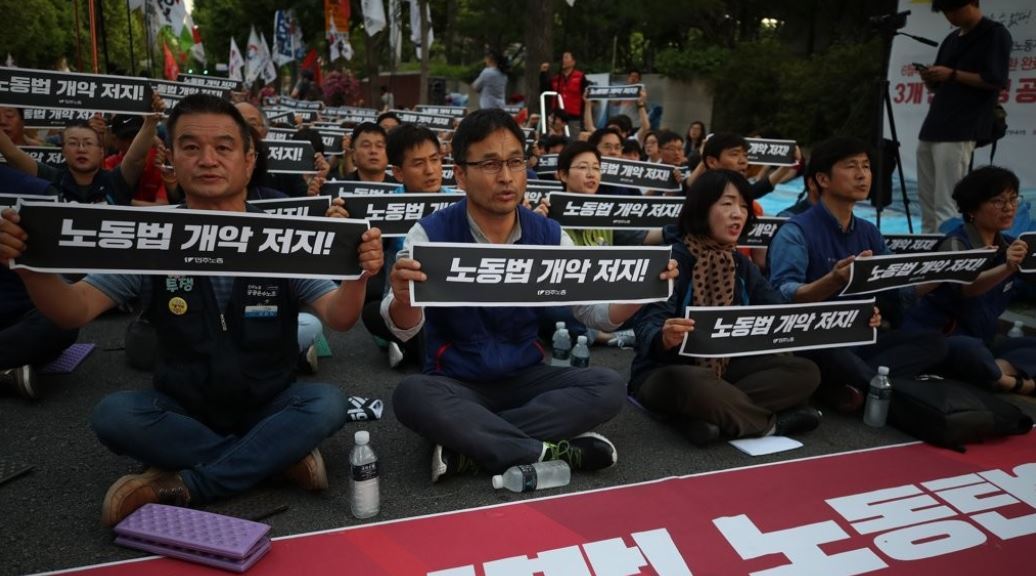[Newsmaker] Doubts rise over S. Korea’s willingness to ratify ILO conventions
If EU panel rules Korea has violated the FTA, it could put similar deals at risk
By Kim Bo-gyungPublished : June 23, 2019 - 19:47
In the midst of a yearlong standoff between the government, labor and management over South Korea’s ratification of fundamental International Labor Organization conventions, trade unions are increasingly questioning the Moon Jae-in administration’s willingness to approve three of the four pending ones.
With the arrest of Kim Myung-hwan, president of the Korean Confederation of Trade Unions, Friday, the relationship between the government and the unions looks set to worsen in the coming days.
With the arrest of Kim Myung-hwan, president of the Korean Confederation of Trade Unions, Friday, the relationship between the government and the unions looks set to worsen in the coming days.

The KCTU is one of the largest labor groups with some 1 million members.
“Working hours are the highest in Korea among OECD member nations. Working hours are three months more (per year) than Germany and a month more than Japan. It also has the highest rate of industrial accidents and the highest ratio of nonregular workers. This is the reality,” said Shin In-su, legal director of the KCTU, during a debate last week in western Seoul.
“Ratifying key ILO conventions to improve the working environment to 70 percent to 80 percent of international levels is the most adequate choice for Korea’s reality,” Shin said.
His remarks were in response to opponents of the ILO conventions, who claim they are unsuitable for “Korea’s reality” in which labor unions wield significant influence.
The debate was hosted by the Korea Labor Institute to discuss sticking points in the ratification of ILO conventions, but ended with participants from academia, labor and management unable to reach a consensus.
Under pressure from labor unions to sign the conventions prior to legislative changes, the Moon administration has made it clear that it is working to pass three of the four pending ILO conventions -- No. 87 regarding freedom of association and protection of the right to organize, No. 98 on the right to organize and collective bargaining, and No. 29 about abolition of forced labor -- at the next regular National Assembly session in September.
“It is right to sign the key conventions before legal amendments are made. Based on the convention on the freedom of association, we would be given a grace period of a year to make legislative changes,” Shin added.
He criticized the Moon government for failing to take action that does not require parliamentary approval.
“Instead of doing what it can, it is holding debates. This is why we’re saying the government does not have the will,” Shin said.
Pointing to the government’s vague stance, Jung Young-hoon, a researcher at the National Assembly Futures Institute, said the government has not yet provided clear guidelines on the needed legal revisions.
“The government says ‘there need to be revisions to law that contradict the purpose of the convention.’ It is still using vague language as to what contradicts the purpose and makes us doubt the government’s declared position,” Jung said.
On the other side of the debate, the Korea Employers Federation, which has been pushing for conditional ratification of the ILO conventions, stuck with its long-held argument that approving the conventions would bestow excessive authority to the already powerful labor unions.
“Korea has the lowest labor-management competitiveness. Strikes are very common. A certain company has gone on strike every year for the past 30 years,” said KEF Director General Kim Young-wan.
“The reality of labor unions of full-time workers at conglomerates is that companies have to be careful (with unions) to the point where they need approval from them to move products to another country,” Kim said.
The KEF is adamant that three conditional terms must be agreed upon to give the ILO conventions the green light: It wants a prohibition on striking workers taking over facilities; the abolition of a ban on substitute workers; and the abolition of a law criminalizing unfair labor practices.
With no end in sight to the impasse, academics forecast a gloomy outlook on the country’s economy if the deadlock continues.
“When it comes to Korea’s violation of the FTA, the EU is not just raising the issue of the lack of efforts in ratifying the key conventions. The bigger question it is raising is Korea’s violation of an article of a labor law Korea declared in 1998,” said Lee Seung-wook, a professor of law at Ewha Womans University, referring to the ILO Declaration on Fundamental Principles and Rights at Work that was adopted in 1998.
Lee added if a panel of experts convened by the EU rules Korea to have violated the FTA, it would jeopardize FTAs with the US and Canada.
Ramping up pressure on Korea to pass the remaining four out of eight ILO fundamental conventions, the EU began the dispute settlement process in late December, saying it would hand over the case to a panel of experts if Korea does not make progress.
As the final stage of dispute settlements, convening a panel of experts to oversee the case would deal a blow to South Korea’s brand image on the international stage.
South Korea vowed to make efforts to ratify the ILO conventions in the 2011 FTA it signed with the EU.
South Korea joined the ILO in December 1991 and became the 152nd member country. So far, it has ratified 29 of its 189 conventions.
By Kim Bo-gyung (lisakim425@heraldcorp.com)


















![[Today’s K-pop] BTS pop-up event to come to Seoul](http://res.heraldm.com/phpwas/restmb_idxmake.php?idx=642&simg=/content/image/2024/04/17/20240417050734_0.jpg&u=)